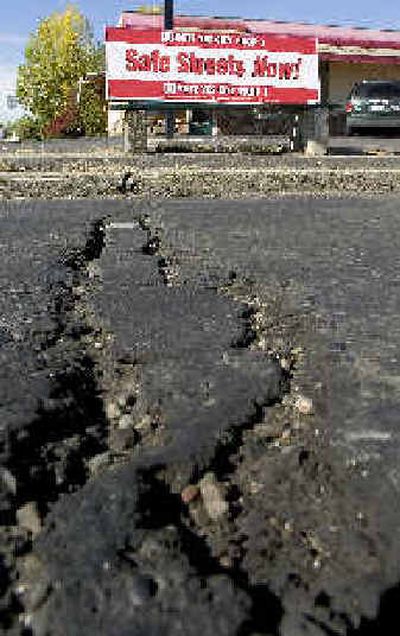City street measure faces a tough sell

If there is a ground zero in Spokane’s war on potholes, the North Side intersection of Wall and Rowan could be it.
A bus bench there screams the pitch of proponents of a $117 million street measure that voters will decide on Nov. 2.
“Safe Streets Now, Vote Yes Prop 1,” the sign says.
Large fissures in the nearby asphalt gape back in silent witness to the need. Safety is an issue when streets are this bad, proponents say.
If approved, the measure would raise property taxes an estimated $68 a year on a $100,000 home. Bonds would be sold to raise the money, and the work would be paced out over 10 years.
Wall Street between Wellesley and Francis would be fixed in 2010, the fifth year of the repair program outlined by the city. Nearly three dozen arterial segments in all would get rebuilt.
Voters in this part of Spokane are a skeptical bunch, however.
Jim Southwick, a retired railroad car man, was waiting Friday morning to get his hair cut at Noel’s Barber Shop next to the intersection. He said he had just written a check to the county for his second-half property taxes.
“I don’t think the property owners should fix the streets,” Southwick said.
Southwick pointed out that many people, including him, live in homes worth upwards of $200,000. That means the measure would cost him between $2,000 and $3,000 over the life of the bond repayment, he said.
He agrees with the need to fix city streets, but the cost should be spread to all drivers in the city, not just property owners, he said. He suggested adding charges to tire purchases, with a higher fee placed on studded tires to offset the wear they cause to pavement.
Proponents said they had few other choices than to seek a property tax measure. The state Legislature allows local governments only a handful of choices for raising extra money to fix streets, they said.
Most of the streets proposed for repair are not eligible for state or federal grant money. They must be repaired with locally generated funds, officials said.
Spokane has an estimated $200 million backlog of broken, rutted streets that must be repaired with locally generated funds, officials said. The proposed bond issue would fix about half of the problem, including 37 miles of arterials, 52 miles of residential streets and other projects. In all, as many as 110 miles of streets would be rebuilt or paved.
“If we don’t do it now the roads are going to continue to get worse,” said Councilman Al French, one of the bond measure’s proponents.
It’s clearly an uphill battle.
The last time the city asked for a property tax bond measure to fix streets was in 2002. Voters gave the measure a mere 44 percent yes when a 60 percent approval was needed for passage, the same majority that is needed this year.
Another property tax bond issue in 1996 was rejected, and a countywide local-option gas tax was turned down in 1997.
Some voters argue the city isn’t spending gas tax money it already receives through the state. “There’s so much money that goes into the general fund,” said Len Champion, a retired firefighter. “You’d think there would be enough money there to fix the streets.”
“There isn’t a secret stash,” French said. This year’s budget problems should give citizens some idea that extra money is not available, he said
The city’s share of the state gas tax has declined over the years because a fixed percentage going to all cities has remained unchanged while the number of cities statewide has grown through incorporations, including Spokane Valley. Also, the city spends a portion of its maintenance money using liquid de-icer in the winter and sweeping up dust and dirt to meet federally mandated air-quality standards.
Mayor Jim West has made street repair a cornerstone of his first year in office. He said good streets are important for economic development and jobs.
“Inaction is not an alternative,” the mayor said.
In an effort to improve voter confidence in street spending, West has proposed a seven-member citizen street commission to oversee street spending and the bond issue, if the measure is approved.
The council is expected to take action on the street commission at Monday night’s council meeting at 6 p.m. at City Hall.
Critics said the property tax measure puts the burden on local residents, and not all drivers, including those who live outside the city.
“Why don’t they fix the roads and up the sales tax?” asked one woman, who did not give her name because she works in a local government position. “Then it’s spread equally.”
Councilman Bob Apple suggested placing a small charge on parking spaces to help spread the cost to all motorists.
Apple predicted the bond issue would fail, in part because voters are increasingly concerned about budget cuts this year and next year in tax-funded services.
He called for using a better grade of asphalt, with granite rock in the mix, to make road surfaces harder and longer lasting.
The bond issue proposal came out of years of work by staff members and citizens who have identified the streets in greatest need of repair.
Last winter, West solicited help from neighborhood representatives.
The city then held a series of public forums last summer to gather input on the proposal.
The mayor pointed out that non-city drivers contribute to city street spending through the state gasoline tax they pay at the pump.
“This bond issue is not perfect,” West said, “but we’ve got to start sometime.”